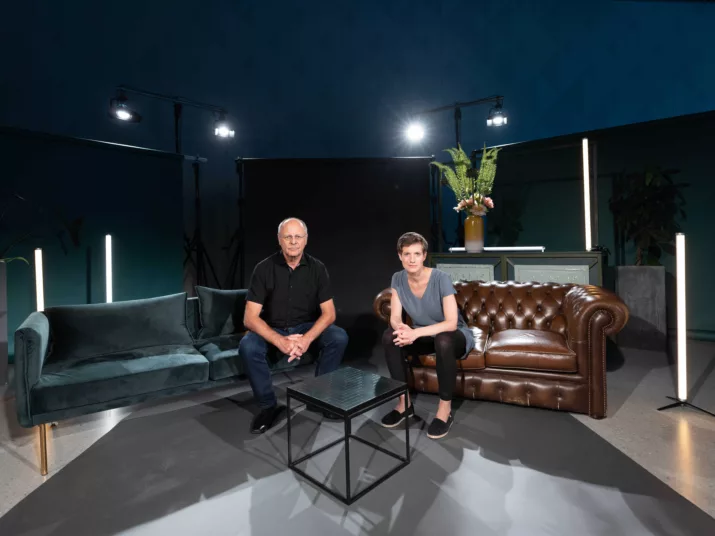
Press release
Everything moves! - Canzler & Kalmbach talk about mobility
How can we make mobility more sustainable and fair in the future? This question marks the start of a new series of talks at the Futurium. Together with their guests, the moderation duo Canzler & Kalmbach go in search of the mobility of tomorrow in the Youtube series. The first episode will be released on 28 July 2021 at 5.30 pm.

"Mobility is an integral part of our everyday lives. Many activities and lifestyles are difficult to imagine without mobility," explains Karena Kalmbach, Head of Strategy and Content at Futurium. The expert on the history of the environment and technology - together with the mobility researcher Weert Canzler - is the host of the new YouTube series "Alles bewegt! (Everything moves). "But mobility is not universal: not everyone is equally mobile. And just as mobility has always changed in the past, it will always keep changing in the future," Kalmbach continues. "In this series of talks, we discuss how we can actively shape these changes. Because precisely because mobility is so important in our everyday lives, we have to ask ourselves what our mobility should look like in the future."
In the YouTube series "Alles bewegt!” (Everything moves), the moderation duo Canzler & Kalmbach collects thoughts, scenarios and perspectives on the mobility of the future together with various experts. They look for answers together: What forms of mobility, what social changes and technical innovations do we want? How and for what do
we want to use them? Diverse forms of mobility and fairness in mobility: Is that what we need?
The moderators of the digital event series are Dr. habil. Weert Canzler, mobility researcher at the Social Science Research Center Berlin, and Dr. Karena Kalmbach, Head of Strategy and Content at Futurium and expert in environmental and technological history.
From July 2021 to March 2022, a new episode will be shown every month on the Futurium's YouTube channel. All episodes will also be available with subtitles in simple language.
Information about the first episodes:
#1: Everything moves! CO2 free by 2045
Our first topic in the YouTube series: CO2 free by 2045. This means achieving climate-neutral road travel by then. So how do we address the need for changes in mobility and the climate change challenge in 2021? How far have we come and what are the major fields of action? Canzler & Kalmbach talk to Mathis Wackernagel from the Global Futurium gGmbH, Communication, Press release 27.07.2021, No. 11 /2021
Page 2 / 3 Footprint Network about this topic. He is considered to be a leading thinker in the field of sustainability and developed the concept of the Ecological Footprint together with William Rees.
Guest: Mathias Wackernagel, Global Footprint Network
28.07.2021, 5.30 pm Link:
#2: Everything moves! The road to clean transport and traffic
Does climate-friendly automatically mean less mobility? Sustainable mobility in the future cannot be put into practice without a transport and energy turnaround: but, what does this really mean? Canzler & Kalmbach have invited Christian Hochfeld to be their guest. The director of the think tank Agora Verkehrswende (traffic turnaround) previously headed the Sustainable Transport Programme in China at the Deutsche Gesellschaft für Internationale Zusammenarbeit (GIZ) (German Society for International Cooperation). The conversation with him focuses on what promising levers for change could look like, the trend towards electric drives and global strategies for sustainable transport. Christian Hochfeld believes that we cannot subsidise our way out of the climate crisis, but need a broad mix of policies. And technological change must go hand in hand with a change in how we perceive mobility, with fewer private cars and more public and shared transport.
Guest: Christian Hochfeld, Director of the think tank Agora Verkehrswende
25.08.2021, 5.30 pm
#3: Everything moves! The city and the countryside - end of the road for the relationship?
Canzler & Kalmbach open up the discussion about a fair transport turnaround with calm, objectivity and positive energy. They talk about possible solutions for the everyday life of commuters, about urban and rural exodus as well as about the shortage of space in urban areas and inaccessible regions in rural areas. Stuck in the countryside or a privileged group? What role can working from home and digital work play in the transport turnaround? Is the autonomously driving shuttle the solution to rural traffic problems? Canzler & Kalmbach leave the car-centric current situation for the time being and have invited transport geographer Barbara Lenz to explore new ways of thinking about how to connect urban and rural spaces.
Guest: Barbara Lenz, Professor of Transport Geography at Berlin's Humboldt University and former Director of the DLR Institute for Transport Research
29.09.2021, 5.30 pm
More information here.
About the Futurium
The Futurium is a house of futures. Here everything revolves around the question: How do we want to live? Visitors can discover many possible futures in the exhibition, discuss them together in the forum and try out their own ideas in the Futurium Lab. Today we already know that in the future, we will have to overcome great challenges. How can we get a grip on climate change? Which technologies do we want to use in the future? Does technology serve us - or do we serve it? How do we want to live together as a society - do we have alternatives to the "higher-faster-further” model? The future is also created by how we act and decide in the present. The Futurium in Berlin, which openend in September 2019, wants to encourage all visitors to engage with the future and help shape it. The digital programme is available at www.futurium.de as well as on the social media channels YouTube, Facebook, Twitter and Instagram.